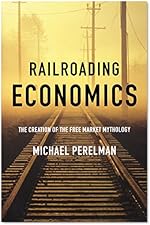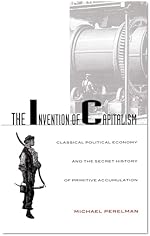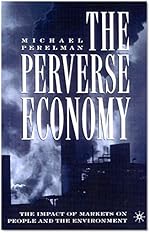Archive for September, 2008|Monthly archive page
Crisis Commentary: Second Installment
I just posted the second installment on my crisis commentary. Again, I would appreciate any comments, since it still needs more work.
Thanks.
George Bush solves the immigration crisis
Give George Bush credit. He is managing to shut down the flow of illegal immigration. Of course, he did it by trashing the economy, but now people are not as enthusiastic about coming to work in the United States.
The Financial Crisis Goes Beyond Finance
I just dashed off the first draft of a discussion of the financial crisis to be published in a South Asian publication. It is still very preliminary. I could appreciate any pointers. Thanks.
Financialization: From The Confiscation of American Prospection
Here is a brief discussion of financialization taken from my recent book: The Confiscation of American Prosperity
An Alternative Bailout Plan
How about instead of giving a couple trillion dollars to the financial institutions, instituting a financial holiday — something like FDR created — and use the trillions of dollars to create infrastructure and affordable housing?
We could also raise some more money by ending the wars and cutting back military spending.
Some of the money would be left over to create national health care, alternative energy, and tuition support.
If we needed more money beyond that, we could raise taxes. With all the spying on ordinary people, the NSA must certainly know where the fat cats are hiding their money in tax shelters.
Sure, there would be problems. People would need access to their money to get groceries and the like before the jobs were online. But the plan suggested here seems no more outrageous than rewarding the felons for their crimes.
Something patched together by the Treasury this quickly is sure to do more damage than any outrageous suggestions made above.
Travis Fast’s Suggestion
Travis Fast made an excellent proposal as a comment here, but it deserves a more prominent exposure, so I thought it would be ok to post it here.
I have a proposal. Buy toxic sub-prime at 40 cents on the dollar. Disaggregate and re-sell to home owner at 50 cents on the dollar thereby ensuring the tax payers a minimum real 25% return on 2 trillion and the bottom third of the mortgage market mortgage on a house for half the originally bloated asking price. That puts a floor in valuations and makes sure that the losses are suffered by those who took “the risks.”
Hey, Secretary Paulson, Whatever Happened to Shock Therapy?
I thought the believers in the market accepted the logic of shock therapy. You know, when country stray too far from market fundamentals they need tough medicine to make their economy strong.
Consider the case of Jeffrey Sachs writing in his recent book, The End of Poverty. Looking back on his first prescription of shock therapy in the destitute nation of Bolivia Sachs had a revelation. He realized that “Bolivia’s physical geography was a fundamental feature of its economic situation, not merely an incidental fact …. Of course I knew that Bolivia was landlocked and mountainous …. Yet I had not reflected on how these conditions were key geographical factors, perhaps the overriding factors, in Bolivia’s chronic poverty …. Almost all the international commentary and academic economic writing about Bolivia neglected this very basic point. It bothered me greatly that the most basic and central features of economic reality could be overlooked by academic economists spinning their theories from thousands of miles away.” Yet, he concluded: “Monetary theory, thank goodness, still worked at thirteen thousand feet.”
Financial Health Versus Children’s Health
Please help me out here. Bush vetoed the Children’s Health Insurance Program fearing that the legislation could add $35 billion over five years.
Financial Catastrophe: Here We Go Again
I mentioned earlier that I thought that looking at production and distribution of income was crucial to understanding the financial crisis. Of course, the financial side provided the tipping point.
Some thing similar happened a few decades ago with another war, a different Bush, and John McCain. Many years ago, Lyndon Johnson, who would have just celebrated his hundredth birthday couple days ago, found himself stuck in a war he couldn’t win. He also knew that if he raised taxes to pay for the war, the public would demand an immediate halt with an intensity that he could not resist. Johnson relied on borrowing, which raised interest rates. Continue reading
Two Vignettes of Regulation: I
Bureaucratic regulation is very difficult. Even when the government sets up regulations, financial corporations manage to circumvent them without much more oversight than domesticate politicians are willing to provide.
In contrast, enormous resources are used to micromanage people without much power. This type of regulation is strangling education. Instead of single payer, ridiculous regulations of medicine are costing lives. Here is valuable testimony from a doctor writing in the new York Times.
“Not long ago, a colleague asked me for help in treating a patient with congestive heart failure who had just been transferred from another hospital. When I looked over the medical chart, I noticed that the patient, in his early 60s, was receiving an intravenous antibiotic every day. No one seemed to know why. Apparently it had been started in the emergency room at the other hospital because doctors there thought he might have pneumonia. But he did not appear to have pneumonia or any other infection. He had no fever. His white blood cell count was normal, and he wasn’t coughing up sputum. His chest X-ray did show a vague marking, but that was probably just fluid in the lungs from heart failure.” Continue reading
 Comments (5)
Comments (5)
 25 – The Confiscation of American Prosperity: From Right-Wing Extremism and Economic Ideology to the Next Great Depression
25 – The Confiscation of American Prosperity: From Right-Wing Extremism and Economic Ideology to the Next Great Depression 30 – Manufacturing Discontent: The Trap of Individualism in Corporate Society
30 – Manufacturing Discontent: The Trap of Individualism in Corporate Society Class Warfare in the Information Age
Class Warfare in the Information Age Railroading Economics: The Creation of the Free Market Mythology
Railroading Economics: The Creation of the Free Market Mythology Steal This Idea: Intellectual Property Rights and the Corporate Confiscation of Creativity
Steal This Idea: Intellectual Property Rights and the Corporate Confiscation of Creativity The Invention of Capitalism: Classical Political Economy and the Secret History of Primitive Accumulation
The Invention of Capitalism: Classical Political Economy and the Secret History of Primitive Accumulation The Perverse Economy: The Impact of Markets on People and the Environment
The Perverse Economy: The Impact of Markets on People and the Environment